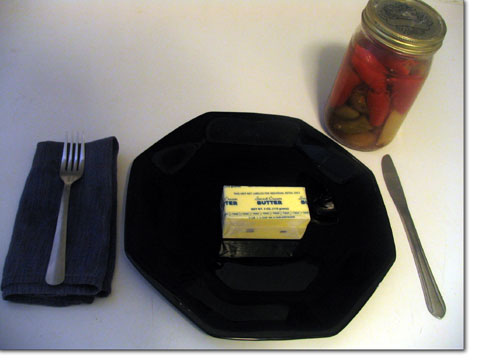| ||
Sowing the seeds of fat
by Chef Boy Ari Short cold days, long colder nights … it’s easy to understand why so many cultures choose this time of year to stage major celebrations – many of which involve light, food and camaraderie. To rage against the dying of the light is a deeply rooted need, and in times like these, a little heat, humanity and good food go a long way. Thus, as the empty, cold, dark days threaten to swallow us whole, it’s time to swallow back. It’s time to rub our hands together, light candles, gather indoors, extend our glasses, and feast. The poet Basho once said, “Seek not what the ancients had, but what they sought.” And you can be sure that this time of the year, the ancients sought fat. During warmer seasons, we don’t need as much antifreeze in our pipes. But as the days cool, we must think in terms of R-value. Once, I heard an arctic explorer talk on the radio. She explained that when you’re exploring the arctic and freezing your ass off, there is nothing that you would rather eat than a stick of butter rolled in sugar. That’s your body hungering for the calories it needs to survive. It reminds me of what my friend Stewart, who went to cooking school, used to say: fat is flavor. The phrase rolls nicely off the tongue, but fat alone isn’t enough. While I’ve never been to cooking school, it’s a truth my mouth holds self-evident that flavor depends on the proper presentation of fat. So please, whatever you choose to put on your table this winter, make sure there’s plenty of fat involved. Serving steak? Then why not lard it with a little bacon grease, or perhaps a butter-oregano sauce? When your fat is in place, the next step is to activate that fat. And for this, there is nothing better than acid. While fat coats the tongue, acid will cut through and tingle the taste buds. A few pomegranate seeds on top of your oregano butter will turn grub into art. This fat/acid equation is behind many culinary standards, such as wine and cheese, oil and vinegar, lemon juice upon fish, tartar sauce. The acid/fat symbiosis really hit home for me next to a bed of coals in Argentina. After a meal of barbequed beef, my friends and I sat around the fire chatting, watching the stars, and sipping red wine. Even though my belly was full, the taste of that Argentine beef was so intoxicating that I wanted to keep chewing. So I grabbed a bone that still had some material attached to it, and started gnawing as my ancestors would have done. Pausing mid-chew for a sip of wine, I was richly rewarded as the wine interacted with the fatty mass in my mouth. Inspired, I put the bones back on the fire and proceeded to pass a fabulous evening chewing the fat and sipping wine. Perhaps gnawing on the bones of winter is where the expression “chewing the fat” comes from. Another fatty expression I like to chew on, especially this time of year, is “living off the fat of the land.” It’s a beautiful thing to eat food that you have procured or produced yourself via direct interaction with the earth. And with the New Year upon us, it’s time to start planning next year’s garden. My garden is heavy on peppers and shallots. Peppers need to get started in the greenhouse in March, while shallots – if they are to be honker shallots – are best started from seed in February. If you want to plant seeds in February or March, you need to order them in January. And if you want to order seeds in January, then you need to get yourself a seed catalog pretty soon. There are plenty of seed companies out there, and serious gardeners often order seeds from several different catalogs. My favorites are Fedco (reads like a story, with whimsical drawings), Johnny’s (awesome pictures, speedy delivery), and Peaceful Valley Seeds. Fast forward a year, and the peppers whose seeds I am now preparing to order will be pickled in cider vinegar. Last year’s peppers, meanwhile, are pickled and ready to munch right now with my favorite fatty food, and thus the year comes round. I like to pickle a combination of sweet Klari Baby Cheese peppers and hot Arledge peppers. I’ll munch those pickled peppers all winter long in conjunction with my meat and my grease and my mayonnaise and my cheese. The peppers heat you up, and the fat keeps you warm. Meanwhile, the act of thinking, in the dead of winter, about the seeds I’m going to plant is like the glow of dawn on the horizon after a dark and cold night. •
|


